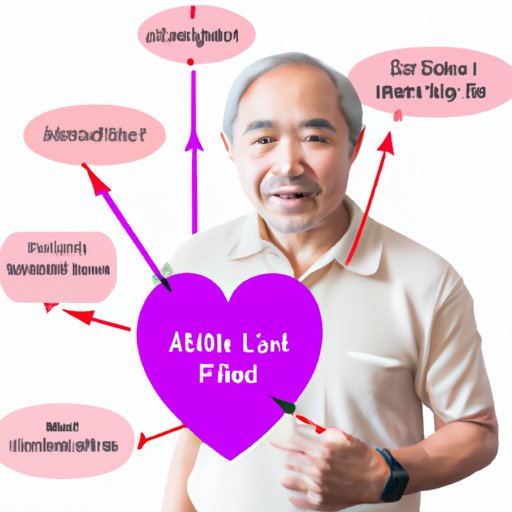
I. Introduction
Atrial fibrillation (AFib) is a common heart condition that affects millions of people worldwide. It is an irregular heartbeat that can cause a range of symptoms and complications if left untreated. Understanding the symptoms and causes of AFib is crucial to managing it effectively and preventing more serious health problems.
II. Understanding the heart condition AFib: A comprehensive guide to its symptoms and treatments
AFib is a condition where the heart beats irregularly, causing blood clots and increasing risk of stroke. It affects the upper chambers of the heart, and can be caused by a variety of factors such as high blood pressure, heart disease, or an overactive thyroid.
There are four different types of AFib: paroxysmal, persistent, long-standing persistent, and permanent. Each type is characterized by the length of time the irregular heartbeat lasts, and the symptoms that accompany it. Understanding which type of AFib you have is important in determining proper treatment.
AFib can be diagnosed through a physical exam, blood tests, and imaging tests such as an electrocardiogram (ECG) or echocardiogram. If left untreated, AFib can lead to more serious complications such as stroke, heart failure, and blood clots.
III. Is your heart beating irregularly? Recognizing common AFib symptoms
AFib symptoms can range from mild to severe, and can vary depending on the individual. Symptoms may include:
- Irregular heartbeat and palpitations
- Shortness of breath
- Dizziness and fatigue
- Chest pain or discomfort
- Changes in blood pressure
If you experience any of these symptoms, it is important to speak with your doctor to determine if they are related to AFib.
IV. Feeling short of breath? Here’s how to identify if it’s related to your AFib
Shortness of breath is a common symptom of AFib, and can be caused by a variety of factors. If you are experiencing shortness of breath, it is important to speak with your doctor to determine the underlying cause.
In AFib, shortness of breath may be caused by a buildup of fluid in the lungs due to the heart’s inability to pump blood effectively. This can increase the risk of pneumonia and other respiratory infections. Understanding the link between the heart and lungs is important in determining proper treatment for AFib-related shortness of breath.
Managing shortness of breath in AFib may include using medication, oxygen therapy, or lifestyle changes such as exercising regularly and quitting smoking.
V. The silent danger: Why it’s crucial to pay attention to AFib symptoms
AFib can be a silent condition, meaning that some people may not experience any symptoms at all. This can make it difficult to diagnose and treat, and can increase the risk of serious health complications.
Risks associated with not treating AFib symptoms include stroke, heart failure, and blood clots. It is important to seek medical attention if you suspect you may have AFib, even if you are not experiencing any noticeable symptoms.
VI. Living with AFib: How to manage and treat symptoms effectively
A range of medications are used to treat AFib, including blood thinners, heart rate control medications, and anti-arrhythmic drugs. In addition to medication, lifestyle changes such as exercising regularly, maintaining a healthy weight, and reducing stress can also help manage AFib symptoms.
Alternative therapies and complementary medicine such as acupuncture, yoga, and meditation can also be effective in managing AFib symptoms. It is important to speak with your doctor before trying any alternative therapies.
VII. The link between lifestyle and AFib symptoms: What you need to know
The lifestyle choices we make can affect AFib symptoms and overall heart health. Maintaining a healthy weight, exercising regularly, and avoiding smoking and excessive alcohol consumption can help reduce AFib symptoms and improve heart health.
There are also specific foods to avoid in AFib, such as those high in salt or caffeine. Your doctor can advise you on the best diet for managing your AFib symptoms.
VIII. Finding relief from AFib symptoms: Insights from doctors and patients
Getting insights and support from doctors and other patients can be helpful in managing AFib symptoms. Tips from doctors may include monitoring your heart rhythm regularly, taking medications as prescribed, and reducing stress through relaxation techniques.
Patients with AFib may also have valuable insights on what has worked for them in managing their symptoms. Support groups and online resources can provide a community of individuals experiencing similar health challenges, and can offer both emotional and practical support.
IX. Conclusion
AFib is a common heart condition that can cause a range of symptoms and complications if left untreated. Understanding the symptoms and types of AFib is important in determining proper treatment and reducing the risk of serious health problems.
Managing AFib symptoms may include medication, lifestyle changes, and alternative therapies. The lifestyle choices we make can also affect AFib symptoms, and it is important to speak with your doctor before making any changes to your diet or exercise routine.
By working with healthcare professionals and making informed lifestyle choices, individuals with AFib can effectively manage their symptoms and improve their overall heart health.




